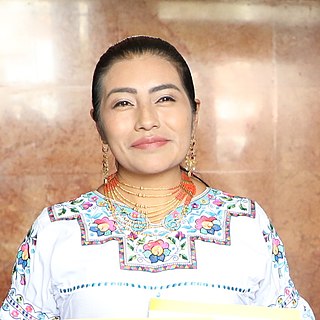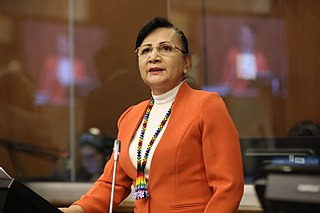
The Democratic Left is a social-democratic political party in Ecuador. It was founded in 1970 by the then congressman Rodrigo Borja Cevallos.

The Communist Party of Chile is a communist party in Chile. It was founded in 1912 as the Socialist Workers' Party and adopted its current name in 1922. The party established a youth wing, the Communist Youth of Chile, in 1932.

The Democratic People's Movement was the electoral wing of the Marxist-Leninist Communist Party of Ecuador and a political party in Ecuador since 1978.

The Pachakutik Plurinational Unity Movement – New Country is a left-wing indigenist party in Ecuador. It was founded primarily as a way to advance the interests of a wide variety of indigenous peoples' organizations throughout Ecuador.

The Popular Unitary Action Movement or MAPU was a small leftist political party in Chile. It was part of the Popular Unity coalition during the government of Salvador Allende. MAPU was repressed during the dictatorship of Augusto Pinochet. In this period, some of its most radical members formed the Movimiento Juvenil Lautaro, whose leaders were political prisoners during the dictatorship and with the return to democracy. Another faction of the former members of the party joined the social democratic Party for Democracy in 1987.

The Radical Party was a Chilean political party. It was formed in 1863 in Copiapó by a split in the Liberal Party. Not coincidentally, it was formed shortly after the organization of the Grand Lodge of Chile, and has maintained a close relationship with Chilean Freemasonry throughout its life. As such, it represented the anticlericalist position in Chilean politics, and was instrumental in producing the "theological reforms" in Chilean law in the early 1880s. These laws removed the cemeteries from the control of the Roman Catholic Church, established a civil registry of births and death in place of the previous recordkeeping of the church, and established a civil law of matrimony, which removed the determination of validity of marriages from the church. Prior to these laws, it was impossible for non-Catholics to contract marriage in Chile, and meant that any children they produced were illegitimate. Non-Catholics had also been barred from burial in Catholic cemeteries, which were virtually the only cemeteries in the country; instead, non-Catholics were buried in the beaches, and even on the Santa Lucia Hill in Santiago, which, in the 19th century, functioned as Santiago's dump.

Parliamentary elections were held in Chile on 4 March 1973, They resulted in a victory for the Confederation of Democracy, an opposition alliance led by the National Party and the Christian Democratic Party. However, they were unable to secure the necessary two-thirds majority in the Senate to remove President Salvador Allende from office.

General elections were held in Bolivia on 12 October 2014, the second to take place under the country's 2009 constitution, and the first supervised by the Plurinational Electoral Organ, a newly created fourth branch of government. Incumbent President Evo Morales was re-elected for a third term.

Lourdes Licenia Tibán Guala is an Ecuadorian lawyer politician and is currently a member of the United Nations Permanent Forum on Indigenous Issues and is considered one of the national leaders of the indigenous movement. She was one of the main opposition assembly members in the Rafael Correa government. She was also member of the National Assembly.

The Popular Unity Movement (UP) is an Ecuadorian political movement of the revolutionary left close to Marxism-Leninism to be conformed with the electoral wing of the Marxist–Leninist Communist Party of Ecuador. The party is a member of the National Agreement for Change.
Movement for People's Unity–Republicans" is a Spanish left-wing republican political party in Spain. The party is a member of Republicans, a federation of political parties in Spain.

Popular Unity, officially registered as the Electoral Instrument for Popular Unity is a left-wing nationalist political party in Argentina, founded by trade union leader and former CTA secretary-general Víctor De Gennaro in 2010. It was part of the Frente de Todos, the coalition formed in 2019 to support the presidential candidacy of Alberto Fernández. It is now part of the Union for the Homeland which was formed to support Sergio Massa's 2023 presidential campaign. From 2011 to 2013 it was part of the Broad Progressive Front (FAP).

Bertha Patricia Sánchez Gallegos is a politician of Ecuador. She is a member of the National Assembly of Ecuador for the Pachakutik Plurinational Unity Movement – New Country party.

Dina Maribel Farinango Quilumbaquin is an Ecuadorian member of the National Assembly of Ecuador. She is a member of the Pachakutik Plurinational Unity Movement – New Country party and she represents Pichincha Province 4.

Ligia del Consuelo Vega Olmedo is an Ecuadorian politician for the Pachakutik Plurinational Unity Movement – New Country party. She is a member of the National Assembly of Ecuador.

Allendism is an ideological current that bases its positions and lines on the government of Salvador Allende, former president of Chile who, together with the Popular Unity, ruled the country until the coup d'état of 1973, headed by Augusto Pinochet. Within the political spectrum, it is located between the left and the center-left, basing its principles on democratic socialism, institutionalism, and reformism. The followers of this current are called allendistas.















